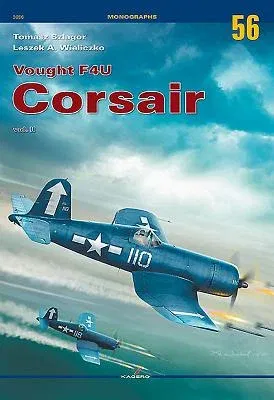The second volume carries on the story of the F4U Corsair by examining
its development and operational service in later stages of the World War
Two.
By early 1944 the Corsair well proved its worth in combat. Finally
qualified for carrier operations, it began to challenge the Hellcat's
status of the US Navy's primary fighter aircraft. The F4U-1D, capable of
carrying nearly a ton of bombs and eight rocket missiles, excelled both
in aerial combat and ground attacks. It's fighter-bomber capabilities
were put to good use during the little-known campaigns in the Marshalls,
Marianas and Palau Islands, as well as in the Philippines, which are
related here in unparalleled detail. Much attention is dedicated to the
initial deployment of the Corsair (both night and day fighters) aboard
US Navy carriers, spanning the period between February 1944 and March
1945, which culminated in the first raids against Japan.
Meanwhile, Vought and Goodyear engineers continued to improve and refine
the Corsair. New, more powerful engines enabled them to develop two more
versions before the war's end - the ultimate Corsair (Vought F4U-4) and
the Super Corsair (Goodyear F2G-1/2). Their story is related in the
opening chapter. A separate chapter is devoted to camouflage and
markings of British and New Zealand's Corsairs, with a brief resume of
the aircraft's service in the two air forces. The book is further
supplemented by numerous data in tabular form, color profiles of five
representative aircraft and 1/48 scale drawings of various versions.

